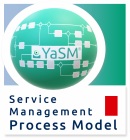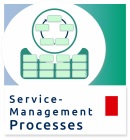SP10: Manage human resources
Process name: Manage human resources - Part of: Supporting service management processes
Previous process: Ensure compliance
Next process: Manage suppliers
Process description
The human resource management process (HRM process) in YaSM identifies and provides the skills and levels of staff required for the service provider to achieve its objectives.
Once the set of required skills is established, the human resources manager will initiate suitable measures to acquire those skills, for example by organizing training and education programs or by recruiting new staff.
The skills available in the service provider organization are managed through the skills register, which describes the skills and lists the individuals who possess those skills.
Note: YaSM contains a basic process for managing human resources, which highlights the most important HR management activities and describes the interfaces with the other YaSM processes.
Sub-processes
The human resource management process in YaSM has the following sub-processes:
- SP10.1: Identify the required skills
- Process objective: To identify the skills which need to be developed, based on an assessment of the current set of skills and future needs.
- SP10.2: Develop the required skills
- Process objective: To define, organize and monitor training and education measures.
- SP10.3: Recruit new staff
- Process objective: To select and hire new staff in line with the service provider's skill requirements.
Process outputs
This section lists the documents and records produced by HRM. YaSM data objects [*] are marked with an asterisk, while other objects are displayed in gray.
- Budget request
- A budget request is typically issued to obtain funding for setting up, improving or operating a service or process. An approved budget request means that the required financial resources have been allocated by the financial manager. [*]
- Skills development plan
- The skills development plan is used to manage the acquisition of the skills required to deliver the service provider’s range of services. The addition of new items to the skills development plan is often triggered by the introduction of new services and/ or technologies. [*]
- Skills inventory
- The skills inventory identifies the skills required to deliver the service provider's current and future range of services, as well as the individuals who possess those skills. The skills inventory is an important tool for identifying areas where skills need to be developed or improved. [*]
Notes:
[*] "YaSM data objects" are those documents or records for which the YaSM model provides detailed recommendations: Every YaSM object has an associated checklist (see example) describing its typical contents, and an associated lifecycle diagram depicting how the status of the object changes as it is created, updated, read and archived by various YaSM processes (see example).
"Other objects" are mostly informal data or information where YaSM has less strong views about their contents. There are no associated lifecycle diagrams or checklists.
Process metrics
Process metrics are used, for example, to assess if the service management processes are running according to expectations.
For suggestions of suitable metrics, please refer to the list of metrics for the YaSM HR management process.
Roles and responsibilities
Process owner: Human resources manager
- This role ensures that the service provider employs the right balance of staff in terms of skills and experience. The human resources (HR) manager is also responsible for identifying gaps in the organization's current set of skills and for organizing any required skill development initiatives, in line with the service provider's objectives.
| YaSM role / sub-process | Human resources manager | |
|---|---|---|
| SP10.1 | Identify the required skills | AR |
| SP10.2 | Develop the required skills | AR |
| SP10.3 | Recruit new staff | AR |
Notes
Is based on: The human resource management process from the YaSM Process Map.
Process description › Sub-processes › Process outputs › Metrics › Roles






